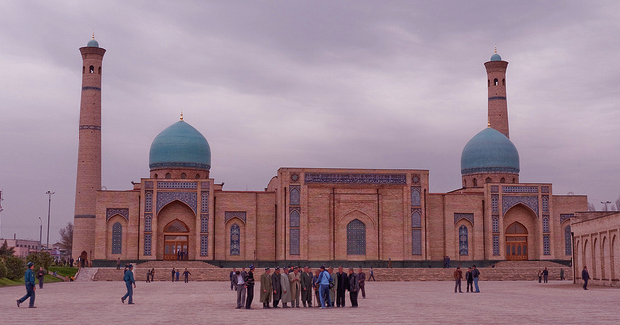A Post-Karimov Uzbekistan

Succession plans are a serious political vulnerability for the ageing leaders of Central Asia. With the death of President Islam Karimov announced in Uzbekistan on 2 September, cloak-and-dagger intrigues are now seriously underway in Tashkent. Who might succeed Islam Karimov as the president of Uzbekistan? And what challenges are they likely to face on taking office?
The hub of Central Asia
Uzbekistan is the most populous country in Central Asia, a former Soviet republic home to just over 30 million people. Islam Karimov ruled unopposed for more than 25 years, transitioning from an engineering career to become the final First Secretary of the Communist Party of Uzbekistan. He declared the country’s independence in 1991 after the collapse of the USSR and built a distinctive identity around Uzbek nationalism and moderate Islam.
Karimov’s rule, however, was characterised by widespread human rights abuses. Ethnic conflict in the troubled Fergana Valley and the spectre of Islamic extremism following 9/11 were used as pretexts for mass imprisonments without trial, systematic torture and the ubiquitous oppression of civil and political rights. Yet his death will be mourned by many Uzbeks who viewed him as the strong leader the country needed for the turbulent early years of independence. It will also now be used as an opportunity for power plays among the country’s elite.
Tashkent intrigues
At first glance, Uzbekistan’s leaders are adhering to the token constitutional reforms it introduced in 2011 and 2014. Chairman of the Senate, Nigmatilla Yuldashev, appears to have assumed the country’s leadership in a caretaker capacity since Karimov’s death. President Vladimir Putin of Russia passed his condolences directly to Yuldashev, a tacit acknowledgement that the chairman will hold the office temporarily while stronger candidates bargain for influence over the coming months.
Prime Minister Shavkat Mirziyoyev is perhaps the likeliest contender. Described unflatteringly as a “fist, not a brain” by Uzbek officials, Mirziyoyev heads the Cabinet of Ministers and would likely have made the crucial decision to announce the deterioration in Karimov’s health to a country where the leader’s health has traditionally remained a closely guarded secret. In addition, Mirziyoyev led the funeral service in Samarkand on Saturday, 4 September, which may be a sign that he seeks to cultivate a better public image and be seen as a natural successor to Karimov. Mirziyoyev belongs to the same clique of elites as the late president, known as the Samarkand clan.
One potential alternative, however, is Finance Minister Rustam Azimov, a career economist who has served in high-profile financial posts in the Uzbek government since the late 1990s. Azimov is viewed as a sophisticated politician, experienced in dealing with the outside world through numerous forums including the European Bank for Reconstruction and Development. Despite belonging to the rival Tashkent clan, he may enjoy support from the main powerbroker, intelligence chief Rustam Inoyatov. It is unclear, however, whether Inoyatov—also from the Tashkent clan—will choose to support a clan connection for a small chance of low-key economic reforms or seek to balance clan influence in the government and maintain the status quo.
Uzbekistan’s next president faces entrenched economic challenges. The decline in global energy prices since 2014 has directly affected Uzbekistan’s natural gas exports, which are traditionally a major source of state revenue. Furthermore, this decline in prices has also hit Russia and Kazakhstan, home to millions of Uzbek guest workers who transfer home remittances that are vital to the economy. According to the Russian Central Bank, annual remittances fell from a peak of US$6.67 billion in 2013 to just $3.05 billion in 2015; a further drop of over $460 million was reported for the first quarter of 2016. Russian authorities have continued to tighten restrictions on migrant labourers, and the Uzbek economy is unprepared to absorb those who choose to return. Karimov’s successor will also have to contend with the volatile black-market value of the Uzbek currency, the som, viewed as an insightful barometer of the country’s true economic health in lieu of reliable data.
Continuity or change?
Accurately predicting regime change is difficult almost anywhere, but opaque governance in the region makes it a herculean task in Central Asia. Only Kyrgyzstan has seen openly violent transitions of power since the Soviet era— twice, in 2005 and 2010—but neither revolution was triggered by the death of an autocratic ruler. Nursultan Nazarbayev in Kazakhstan and Emomali Rahmon in Tajikistan have ruled since the early 1990s, while Gurbanguly Berdimuhamedow in Turkmenistan has continued a personality cult very similar in style and scope to his oppressive predecessor. Forecasting Karimov’s death as a sure-fire sign of change is, therefore, unwise.
Nevertheless, despite few reasons for optimism in Uzbekistan’s near future, the lessons that can be drawn from Karimov’s misrule and the path of his successor will be insightful for its neighbours. Detailing and executing specific plans for diversification away from state-owned energy reserves and driving job creation for domestic labour markets will give regional leaders an opportunity to encourage comparatively smooth (if decidedly undemocratic) successions. It remains to be seen, however, whether Uzbekistan’s next ruler will choose to set the pace, or become the cautionary tale.
Luke J. Dawes is a graduate of Flinders University and Monash University, specialising in Asian languages and political violence in Indonesia. He is an analyst in the finance sector.
This article is published under a Creative Commons Licence and may be republished with attribution.


